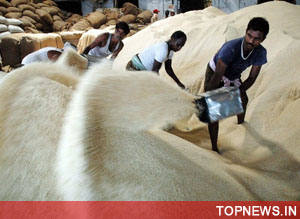eGoM to lift ban on premium non-basmati export

The empowered Group of Ministers (eGoM) will have a meeting on Monday to decide upon the lifting up the ban on premium non- basmati rice varieties. The decision comes in the wake of lowering prices of rice world over recently and the dire need to uphold the nation’s position in the world market.
The ban was imposed on the export of non-basmati rice including premium as well as speciality rice varieties and the eGoM meet that will take place under the chairmanship of Union External Affairs Minister, Mr. Pranab Mukherjee plans to open up the export sector of rice varities such as of Joha from Assam and Ponni from Tamil Nadu and Karnataka. The Ministers of Agriculture, Commerce and Finance and the Planning Commission Deputy Chairman will also be present being the members of the eGoM.
The government plans to have a strong grip on the seemingly downtrend adopted by the economy and making a strong foothold in the area of exports is the call of the day. With inflation lowering down a bit and recessional forces paving their way from developed to developing nations lifting up the ban is a decent resort that will not only boost the country’s economy making it able to meet its import demands but also strike a balance in the nation’s balance of payments account.
The ban on the export of the non basmati products was imposed due to the high domestic prices that rose during 2007-08 and the ban came into effect from April 1 onwards. To ensure the availability of the non basmati rice in the domestic market a minimum export price (MEP) on export of basmati rice was made which is $1,200 a tonne or Rs 48,000 a tonne and a custom duty of Rs 8,000 a tonne effective from 10th May. Thus due to the heavy levied taxes the export of non-basmati and basmati rice in the present fiscal year till October was 6.87 lakh tonnes and 5.44 lakh tonnes respectively, as compared to the last year’s 31.44 lakh tonnes and 5.44 lakh tonnes of export respectively.
The dispatch of the aforementioned exports this year despite the ban was made so as to maintain the relations with the friendly neighbour countries and also as earlier commitment was made with them. While the price of Thai Grade B rice is ruling at price of $560 a tonne in the international market the Indian price stands at $375 a tonne owing to the rupee’s depleting value.
The meet also proposes to have a check on the kind of material exported as it was reported that the Government machinery is ill-equipped to check the export consignment resulting into export of common rice under the pretext of sending the premium varities. Thus port restrictions, quantitative ceiling, packaging restrictions and exported material to be sent only in branded or retail packs and keeping a check on export volumes will be sought for.